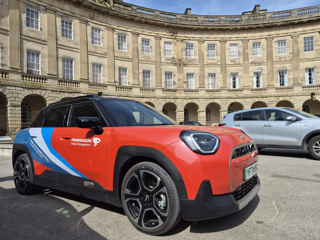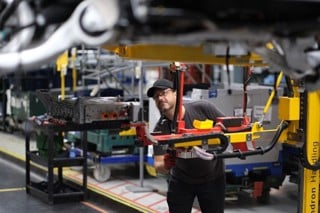Half (49%) of the company cars delivered in the first quarter of 2023 were battery electric vehicles (BEV), according to the latest data from the British Vehicle Rental and Leasing Association (BVRLA).
The high proportion of fully electric company cars, detailed in the latest BVRLA Leasing Outlook Report, suggest that was thanks, in part, to a booming salary sacrifice market, which grew 41% year-on-year, with 91% of registrations pure electric.
These figures are in stark contrast to the retail market, where BEV sales were responsible for 16% of new sales and 1% of used purchases in the first quarter.
“We have had a two-tier transition to zero emission motoring for some time and this growing gap between the fleet and retail sectors’ appetite for decarbonisation could put the 2030 phase-out target in jeopardy,” said BVRLA director of corporate affairs, Toby Poston.
“All these fleet BEV registrations will hit the used market in three or four years’ time. The last year has already shown an increasing imbalance between the fast-growing supply of used electric cars and demand that isn’t keeping up.
“We are working with policymakers, members and colleagues from across the industry these used market barriers.”
Diving further into the detail of Q1 leasing figures reveals more winners and losers amid the general sense of a plateauing market.
Business contract hire remains positive, with the van sector performing particularly strongly – BVRLA members now operate 100,000 more vans than they did pre-pandemic.
The biggest winner has been salary sacrifice schemes, with a phenomenal 41% year-on-year rise in volumes as employees, including drivers who had previously accepted a cash allowance in lieu of a company car, have seized this cost-effective opportunity to access zero emission cars.
For their part, employers have welcomed the chance to offer a highly valued, no cost benefit during a period of wage inflation, and to make an early dent in their Scope 3 emissions from staff commuting to work
Elsewhere, the figures are more mixed. The 40.1% increase in fleet car sales reported by the SMMT during the first quarter of 2023 has not filtered through to BVRLA members’ car fleet, which remained virtually static between Q4 2022 to Q1 2023, at 1,368,799 vehicles.
On the plus side, the rising availability has allowed leasing companies to start replacing cars whose contracts had been extended, although supply is still insufficient to generate net growth, said the BVRLA.
Some of the new fleet sales have also been channelled to other sectors, including rental and Motability, that have also been starved of supply.
There is a marked divergence in the fortunes of business and personal contract hire, with the former increasing its volumes year-on-year, while the latter has suffered a sharp decline.
Business contract hire numbers rose by 3.5% between the first quarters of 2022 and 2023 to 789,742 cars, but personal contract hire declined by 7% over the same period to 303,092 vehicles.
The combination of significantly higher new car prices and soaring interest rates have meant replacing a car on a like-for-like basis can now cost hundreds of pounds per month more, an increase that many private drivers are unable or unwilling to stomach.
Thom Groot, CEO and co-founder of The Electric Car Scheme, said: “Brand-new electric cars are still too expensive for many consumers, with new fossil fuel cars continuing to outsell them.
"But with the tax advantages of salary sacrifice a lease on an electric car becomes incredibly affordable - which is why salary sacrifice is both growing and dominated by clean cars.
“To put this into perspective, for every petrol car obtained by salary sacrifice in the first three months of this year, there were 45 battery electric cars. It’s also encouraging that the larger leasing fleet is itself getting far cleaner, with 43% of new cars battery electric.
“Leased cars are brought new and soon find their way onto the second-hand market. So these hundreds of thousands of cars will be on the second-hand market in a few years helping to drive down the overall cost of electric driving. This will be essential for the UK meeting its net zero target, as transport is our largest source of emissions.”
He continued: “If you’re an employer, getting involved in salary sacrifice is a great way to offer a valuable perk to your employees that costs you nothing - crucial in this inflationary environment.
"It also lets you get a head-start on your own scope 3 emissions as a business, which the public and regulators are getting more and more interested in.
“The Government could do far more to help smooth this transition, most crucially by getting rid of the ‘pavement tax’ that makes charging an electric car in public far more expensive than charging it at home.”
























Login to comment
Comments
No comments have been made yet.